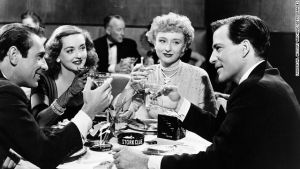Celeste Holm (1917-2012)
Posted by Ivan G. Shreve, Jr. on Jul 16th 2012
A surviving excerpt of radio’s The Fitch Bandwagon from April 23, 1944 features Broadway sensation Celeste Holm singing (complete with Brooklyn accent) the song written by Duffy’s Tavern’s Ed Gardner, “Leave Us Face It, We’re in Love.” It’s one of the earliest on-the-air showcases for the actress who passed away Sunday, July 15, at the age of 95—but it would definitely not be the last. Holm would guest star on such radio favorites as New World A’Coming, Mail Call, Command Performance, Family Theatre and The Big Show…and during the radio drama revival of the 1970s, she made several appearances on The CBS Radio Mystery Theatre.
At the time of her guest shot on Bandwagon, Celeste had already established herself as a presence on Broadway—she was in the original cast of the hit musical Oklahoma!, playing Ado Annie Carnes (the girl who cain’t say no), and had already graced such productions as The Time of Your Life, Eight O’Clock Tuesday, and My Fair Ladies. Born in New York City in 1917, Holm caught the acting bug early during her school years, often performing in school productions. Her parents relocated a great deal (she lived for a time in both Holland and France), but she graduated from Chicago’s University High School for Girls, and then went on to attend the University of Chicago to study drama. After her triumph in Oklahoma!, she landed the lead in a Broadway play called Bloomer Girl…and with that, 20th Century Fox came calling, signing her to a movie contract in 1946 and casting her in the musical Three Little Girls in Blue.

With her third film, Gentleman’s Agreement (1947), Holm hit it out of the park. As worldly magazine columnist Anne Dettrey, she deservedly won the Best Supporting Actress Academy Award that year…one of the three trophies the controversial film would take home (the others were Best Picture and Best Director for Elia Kazan). Celeste put aside any notions of an “Oscar curse” by following up Agreement with engaging performances in films such as Road House (1948), The Snake Pit (1948), Everybody Does It (1949), A Letter to Three Wives (1949), and Champagne for Caesar (1950). She would even be nominated two more times for the Best Supporting Actress Oscar: for her colorful portrayal of French nun Sister Scholastica in Come to the Stable (1949), and as star Bette Davis’ supportive friend Karen Richards in All About Eve (1950).
After Eve, Holm expressed a preference for stage work over films, though she would still occasionally appear in movies such as The Tender Trap (1955) and High Society (1956)—both with Frank Sinatra, and the latter featuring the delightful duet “Who Wants to Be a Millionaire?” Her later features include Tom Sawyer (1973), The Private Files of J. Edgar Hoover (1977) and Three Men and a Baby (1987). But Celeste also explored the early medium of television: she starred in a short-lived sitcom in 1954, Honestly, Celeste!, and would later appear in both guest and semi-regular roles in such TV series as Nancy, Archie Bunker’s Place, Falcon Crest, Loving, Touched by an Angel and Promised Land.
Even in her advanced years, Celeste Holm never lost her dedication to her craft—she completed filming (despite health problems) of a feature film comedy in 2011, College Debts, at the age of 94, and even graced such recent TV series as The Beat and Third Watch. She has left audiences with a rich legacy of splendid film and television work, and she will be sorely missed.

